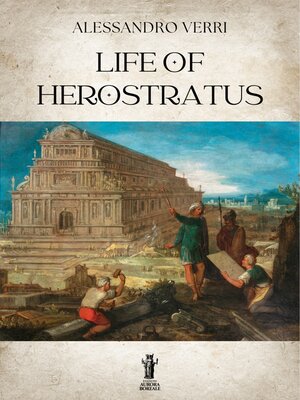
Sign up to save your library
With an OverDrive account, you can save your favorite libraries for at-a-glance information about availability. Find out more about OverDrive accounts.
Find this title in Libby, the library reading app by OverDrive.



Search for a digital library with this title
Title found at these libraries:
| Library Name | Distance |
|---|---|
| Loading... |
Alessandro Verri (1741-1816) was a remarkable intellectual, philosopher, historian, and man of letters from Milan, lived through the transition from the Enlightenment to Romanticism. He is remembered for his friendship with Cesare Beccaria and his contributions to the magazine Il Caffè, which he founded with his brother Pietro.
He began writing Vita di Erostrato (Life of Herostratus) in 1793, a year after being admitted to the Accademia dell'Arcadia in Rome under the initiatic name Aristandro Pentelico.
The work, which was published only in 1815, a year before his death, is a unique and compelling historical novel in which the author, pretending to translate a genuine Greek text—a literary device Verri had already used years earlier in Notti romane al sepolcro degli Scipioni—imaginatively (but not entirely) narrates the adventurous and dramatic life of Herostratus, a Greek from Corinth. After a life filled with failures and disappointments, and for the sole purpose of being remembered by posterity, Erostratus deliberately set fire to the majestic Temple of Artemis at Ephesus, one of the seven wonders of the ancient world.
With an introductory essay by Nicola Bizzi.
He began writing Vita di Erostrato (Life of Herostratus) in 1793, a year after being admitted to the Accademia dell'Arcadia in Rome under the initiatic name Aristandro Pentelico.
The work, which was published only in 1815, a year before his death, is a unique and compelling historical novel in which the author, pretending to translate a genuine Greek text—a literary device Verri had already used years earlier in Notti romane al sepolcro degli Scipioni—imaginatively (but not entirely) narrates the adventurous and dramatic life of Herostratus, a Greek from Corinth. After a life filled with failures and disappointments, and for the sole purpose of being remembered by posterity, Erostratus deliberately set fire to the majestic Temple of Artemis at Ephesus, one of the seven wonders of the ancient world.
With an introductory essay by Nicola Bizzi.







